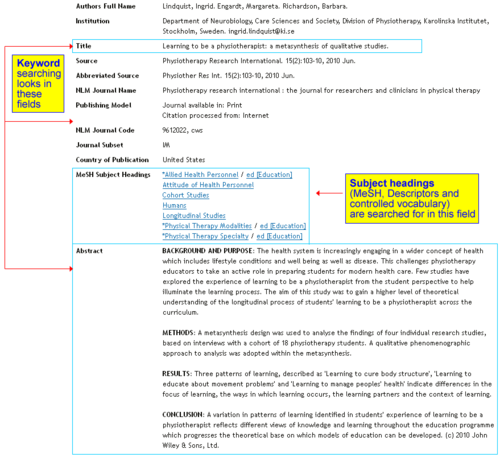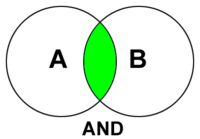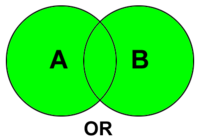Library:Glossary of Subject Searching
Appearance
- Article index/database
- A tool for locating journal article, book, or theses citations on a subject.
- Database record
- The complete set of information about an item arranged in fields. In an article index the fields include citation details such as title, author, date as well as additional information such as abstract, subject headings, date added etc.
- Example from Medline (OvidSP)
- Keywords
- These are any combination of characters that are searched as free text within the record, citation and abstract or (sometimes) the fulltext. There is no meaning attached to keywords; searches can pick up irrelevant results. E.g. Searching for carpal tunnel syndrome as keyword will pick up “The study group excluded carpal tunnel syndrome”. Keyword searching uses truncation and wildcard symbols.
- Subject headings (also called MeSH, Cinahl headings, Emtree, thesaurus)
- Known as controlled vocabulary these words are added to records to describe what is covered in the article. They standardize synonyms and variant spellings to provide consistency. The hierarchical organization of these words in the tree structures assists with developing the search strategy.
- Tree
- The ordered list of subject headings arranged in a hierarchy from broader to narrower terms.
- Subheading
- Qualifying words which can be added to make subject headings more specific. (for example, the subheading rehabilitation can be added to the MeSH heading Carpal Tunnel Syndrome to pick up only those articles on rehabilitative therapy.)
- Boolean operators
- Connectors used to combine search terms to retrieve relevant results:
- Search strategy
- List of search commands for finding information in a database.
- E.g. Medline (ovidsp) search strategy:
- exp “dementia vascular”/
- dementia.ti,ab.
- Alzheimer*.mp.
- 1 or 2 or 3
- exp “exercise”/
- exp “sports”/
- exercise*.ti,ab.
- sport*.ti,ab.
- physical activit*.ti,ab.
- or /5-9
- 4 and 10
- Limit 11 to Aged 80 and over
- E.g. Medline (ovidsp) search strategy:


